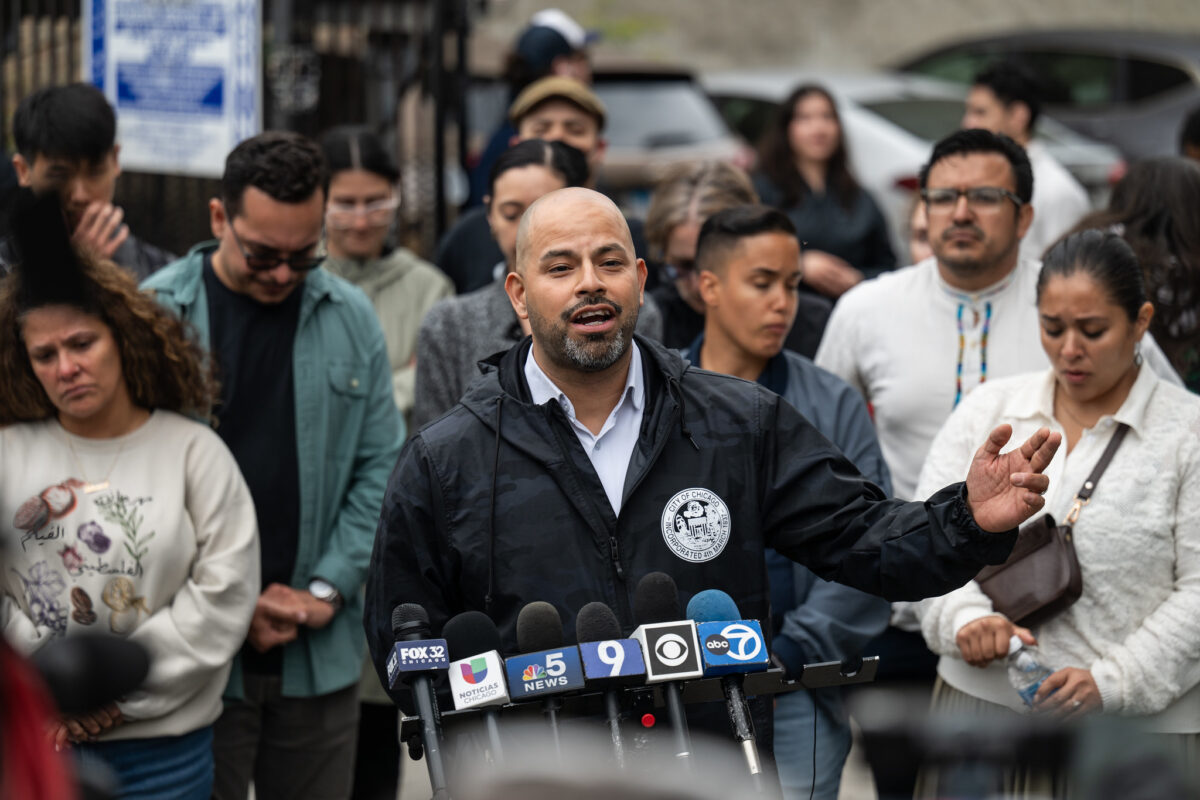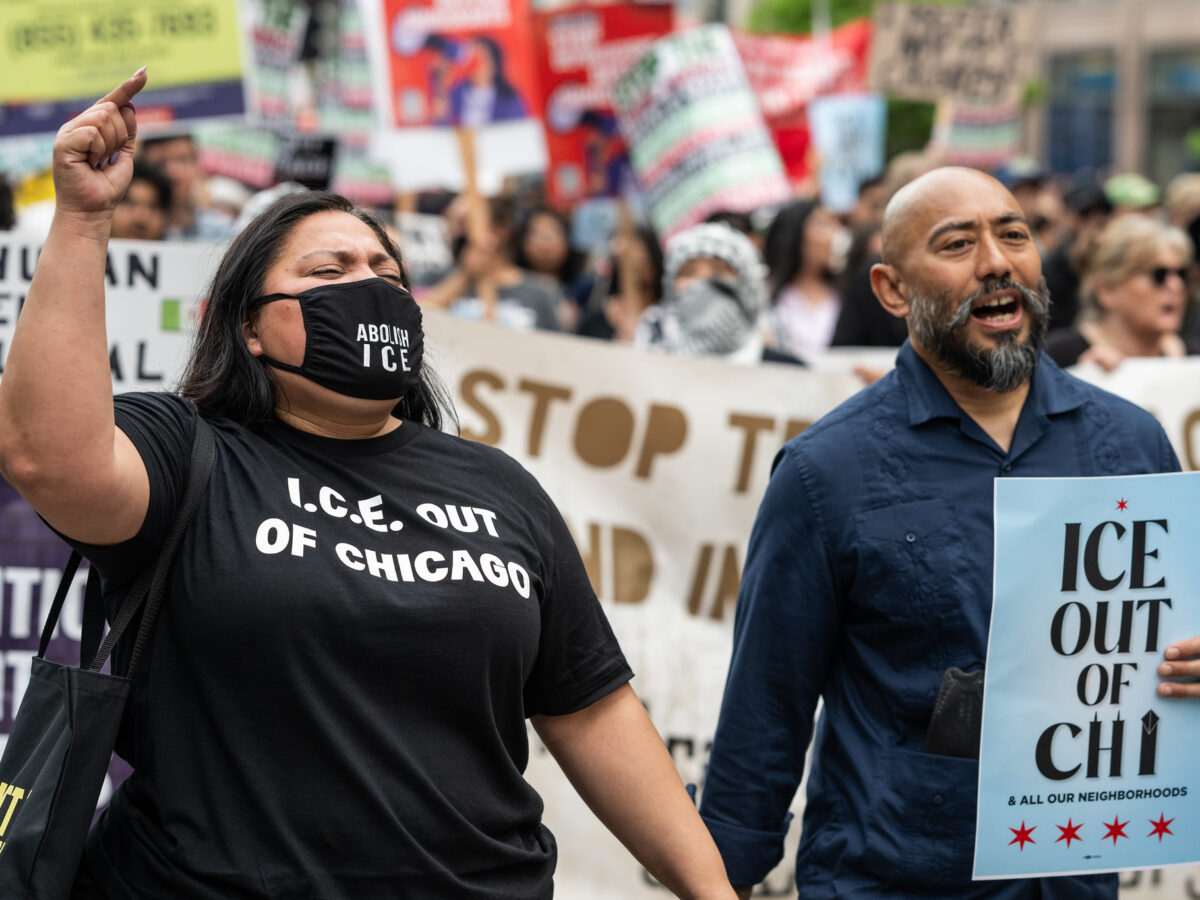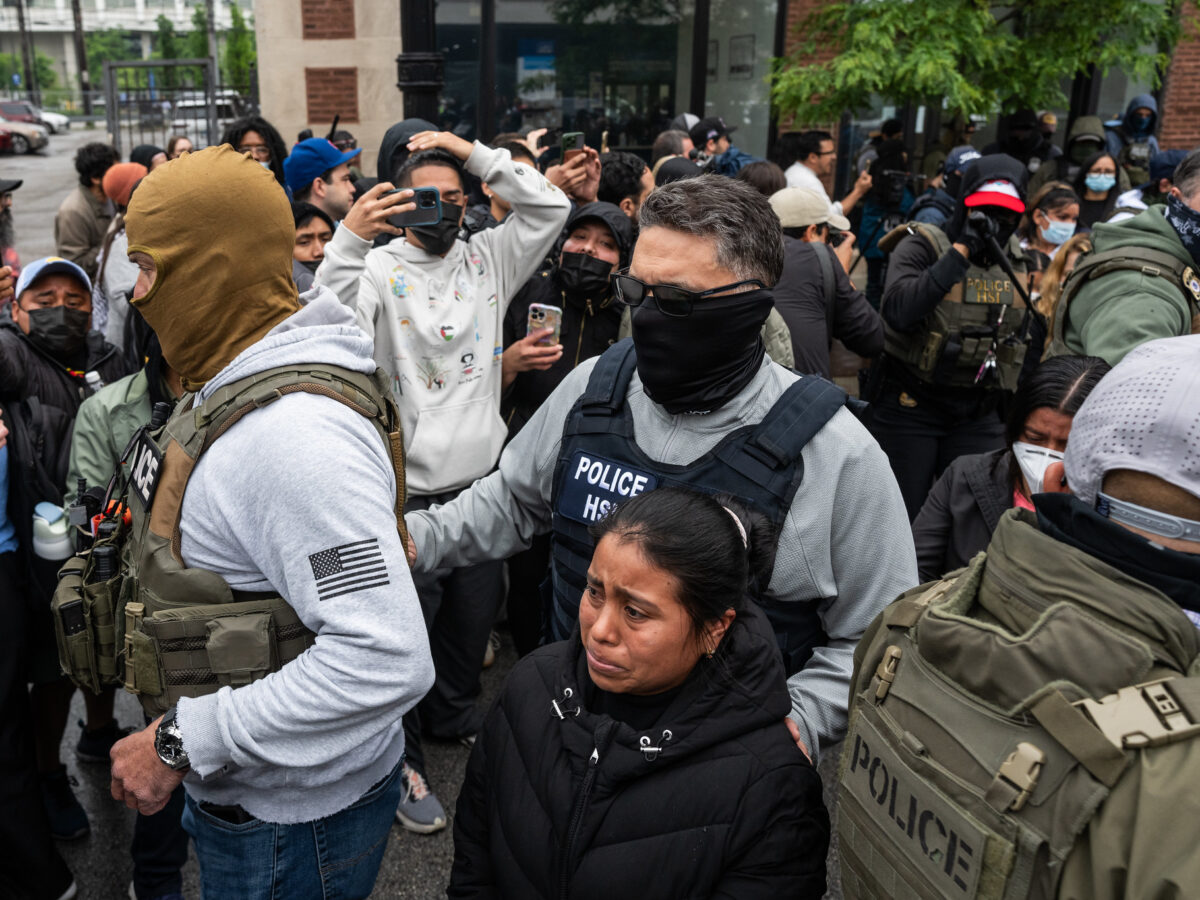The City Council’s Latino Caucus was “deeply disappointed” by Mayor Brandon Johnson and Chicago Police Superintendent Larry Snelling after a June 11 meeting about the police department’s response to federal immigration enforcement activity, according to a letter Caucus Chair Andre Vasquez (40th Ward) addressed to Johnson and Snelling. The letter was signed by Vasquez, who has been a frequent critic of Mayor Johnson, and sent on behalf of all fourteen members of the Latino Caucus.
In the letter, the Caucus expressed frustration that Johnson and Snelling did not present a strategic plan to deal with federal immigration enforcement activity or President Donald Trump’s threat to deploy troops to Chicago. They also criticized the mayor for failing to mention his imminent appointment of Macquline King as interim Chicago Public Schools (CPS) CEO during the meeting. Caucus members only learned about the appointment through an official announcement later that day, which the letter called a “serious affront.”
The Mayor’s Office did not respond to requests for comment.
The meeting was held a week after a chaotic June 4 incident in the South Loop where federal immigration agents detained at least ten people who’d arrived at an ICE facility for check-ins. As word of the detentions spread, immigrant rights advocates, family members, and Caucus alderpersons arrived to protest. Advocates and alderpersons have since raised questions about whether CPD violated Chicago’s Welcoming City Ordinance or the state TRUST Act, which prohibit police from cooperating with federal immigration enforcement.
According to a document the Weekly obtained from the Office of Emergency Management and Communications (OEMC) via a public records request, two calls for assistance were made on June 4 from 2245 S. Michigan Ave, where the ICE facility is located. The first was coded as a disturbance/large gathering, for which the document shows no police response. It was followed by a call to assist a police officer, which drew more than a dozen CPD units, as well as the First District commander and other top brass.
Once there, police officers blocked access to a parking lot adjacent to the ICE facility while the commander and at least one deputy chief entered the facility and appeared to speak to ICE agents. Demonstrators, including several alderpersons, confronted immigration agents and Chicago police officers.
The department later put out a statement saying police were on-site “to ensure the safety of all involved” and that everything CPD did was “in accordance with” the Welcoming City Ordinance.
The Council’s Committee on Immigrant and Refugee Rights, which Vasquez chairs, held a hearing about the incident Tuesday morning.
At the hearing, Chenetra Washington, the deputy director of the city’s 911 center, said two “assist police” calls came in that day from the ICE facility. It’s unclear why the second was not reflected in the OEMC document obtained by FOIA.
Washington said an ICE contractor made one of the calls, while a DHS agent made another, and each identified themselves. CPD Deputy Director Glenn Brooks told the committee that police officers were nevertheless unaware the building housed an ICE facility before they arrived there.
Vasquez told the Weekly that the Civilian Office of Police Accountability (COPA) declined to investigate the incident and attempted to pass it to the Office of Inspector General (OIG), which countered that the investigation is in COPA’s purview.
“There, to this date, has been no independent investigation of anything that occurred on June 4,” Vasquez said Monday. “And that’s the larger problem.”
Inspector General Deborah Witzburg declined to specifically comment on the June 4 incident. She added: “As a general matter, the Welcoming City Ordinance says that any complaints that non-CPD City employees have violated the ordinance come to the OIG.” The ordinance requires the OIG to forward any complaints about CPD members to the police department.
Witzburg reiterated this point at Tuesday’s committee hearing. “I’m inclined to think that if [the ordinance] meant that all violations of the ordinance came to us, it would say that,” she said. But she added that if neither COPA or the CPD’s Bureau of Internal Affairs investigate, “we will do it ourselves.”
A spokesperson for COPA did not respond to the Weekly’s request for comment. At Tuesday’s hearing, COPA Interim Chief Administrator LaKenya White said the agency received two complaints related to the June 4 events, and after internal discussions about jurisdiction, referred both to the OIG.
The Immigrant and Refugee Rights Committee passed an ordinance at the end of the meeting that would require CPD and OEMC to share communications from June 4 with the City Council. The Council may consider the ordinance at its next meeting, scheduled for July 16.
Two alderpersons told the Weekly that shortly after the June 4 incident, Snelling privately placed responsibility for the CPD response on First District Commander David Harris, saying that Harris had made a bad call.
Vasquez said that he doesn’t know the First District commander’s name and didn’t get much detail on how the incident played out. “But I did know there was somebody on site whom I think because this was a new situation, maybe didn’t exercise the best judgment, and it might have come off a little bit tense,” he added.
According to multiple alderpersons who attended the June 11 meeting, Johnson began with a discussion about “values.” When he was asked about CPD and ICE activity, he noted the relationships the Mayor’s Office has with community organizations. Superintendent Snelling addressed Caucus members’ concerns by restating the department’s official position that officers had complied with the Welcoming Cities Ordinance.
In response to concerns Caucus members raised about police sharing arrest data with federal immigration agencies that had submitted public records requests—which the Sun-Times reported CPD did at least a dozen times between November 2022 and March of this year—Snelling reiterated that the police department doesn’t work or communicate with immigration agencies. The Caucus was not satisfied with that answer.
Their letter said the Caucus “expected a serious response to our concerns about data protection, especially in light of documented cases in which arrest records have been shared with the Department of Homeland Security through FOIA requests.”
Caucus member Byron Sigcho-Lopez (25th Ward), an ally of Johnson, said he thinks Vasquez is “weaponizing” the situation against the mayor to gain political points. “I know many people have political aspirations, but now is not the time for political expediency,” Sigcho-Lopez said. He said the Caucus should be “calling out” Governor J.B. Pritzker for his statement that CPD “followed the law” on June 4. “The Latino Caucus has been critical of the [Johnson] administration, and I think they have been very silent on [Pritzker’s] handling” of the incident, he said.
Asked about Sigcho-Lopez’s comments, Vasquez said: “There’s nothing politically expedient about calling for accountability.”
In the letter to Johnson and Snelling, the Caucus also criticized the mayor’s process around hiring Macuqeline King, a former CPS principal and mayoral aide, as interim CPS CEO. King was the mayor’s senior director of educational policy—a position former Mayor Lori Lightfoot appointed King to in 2022—before Johnson tapped her for the interim CEO role. The Latino Caucus had publicly advocated for Johnson to appoint another Latino person to replace outgoing CPS CEO Pedro Martinez and called on the mayor to partner with them on the search. According to the letter, Johnson did not do so. It also said the mayor “seemingly dismissed” their concerns about the “need for reflective representation in city leadership.”
In May, the U.S. Department of Justice (DOJ) opened a civil rights investigation into the City’s hiring practices after Johnson spoke about his administration’s diversity at a South Side church. Johnson had said “Our people hire our people,” and noted his administration included four Black women and two Black men. He’d added: “When you hire our people, we always look out for everybody else.” The Mayor’s Office later released data showing his 105-person staff is 34.3 percent Black, 30.5 percent white, 23.8 percent Latino and 6.7 percent Asian American.
Regarding the DOJ investigation, Vasquez said, “I think that’s why we try to frame it as partnership and coalition, which is what we have been told is what the goal is in the [Johnson] administration.”
The letter also raised concerns about King’s record. King was the subject of several internal investigations between 2015 and 2019 while she was a CPS principal, as first reported by the Tribune. None of the investigations resulted in disciplinary action beyond warnings.
“You speak of partnership and coalition-building, but true partnership requires respect, transparency, and collaboration,” the Caucus’s letter said. “These were not demonstrated.” The letter requested improvements to meetings and communication, as well as a “genuine commitment” to dialogue from Johnson’s administration.
“The residents of this city deserve better,” the letter closed, “and that begins with better leadership and engagement from the Mayor’s Office.”
Editor’s note: This article was updated on July 1 following the Immigrant and Refugee Rights Committee hearing.
Jim Daley is the Weekly’s investigations editor.




